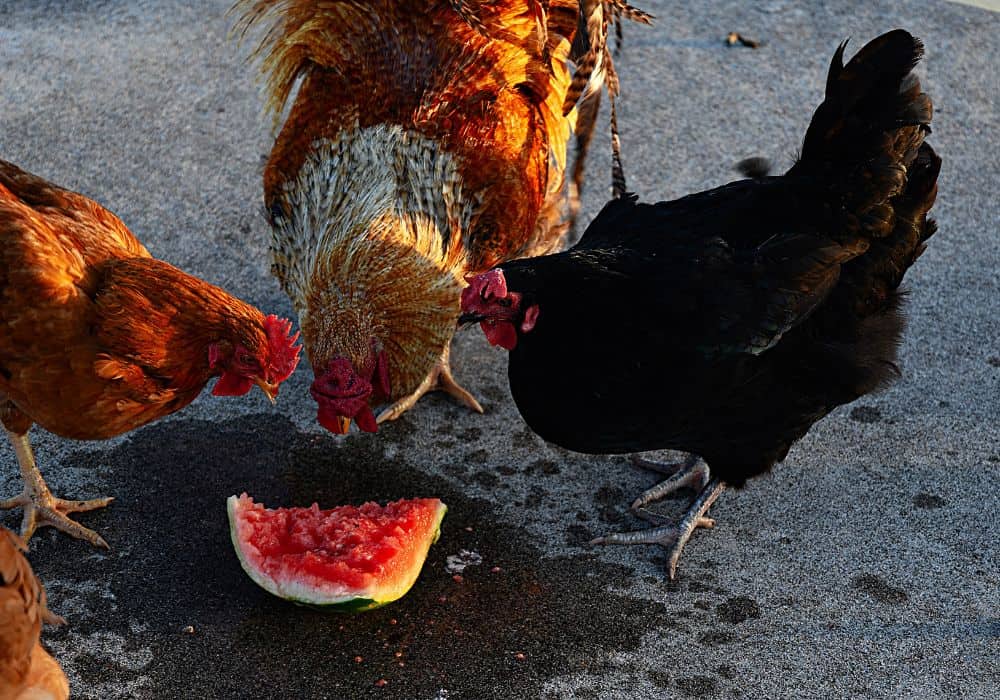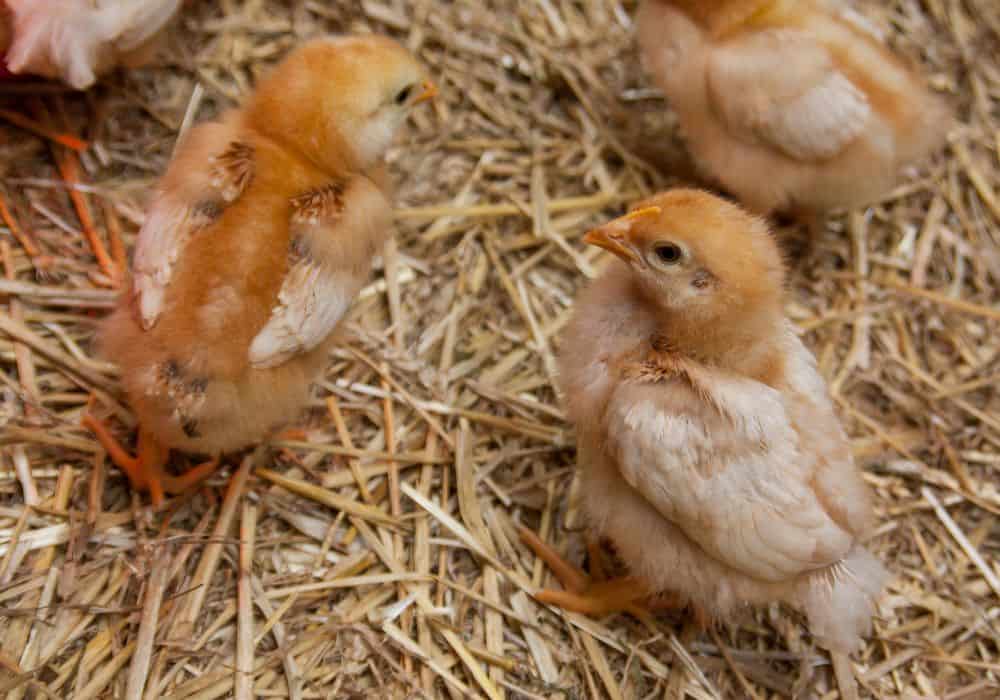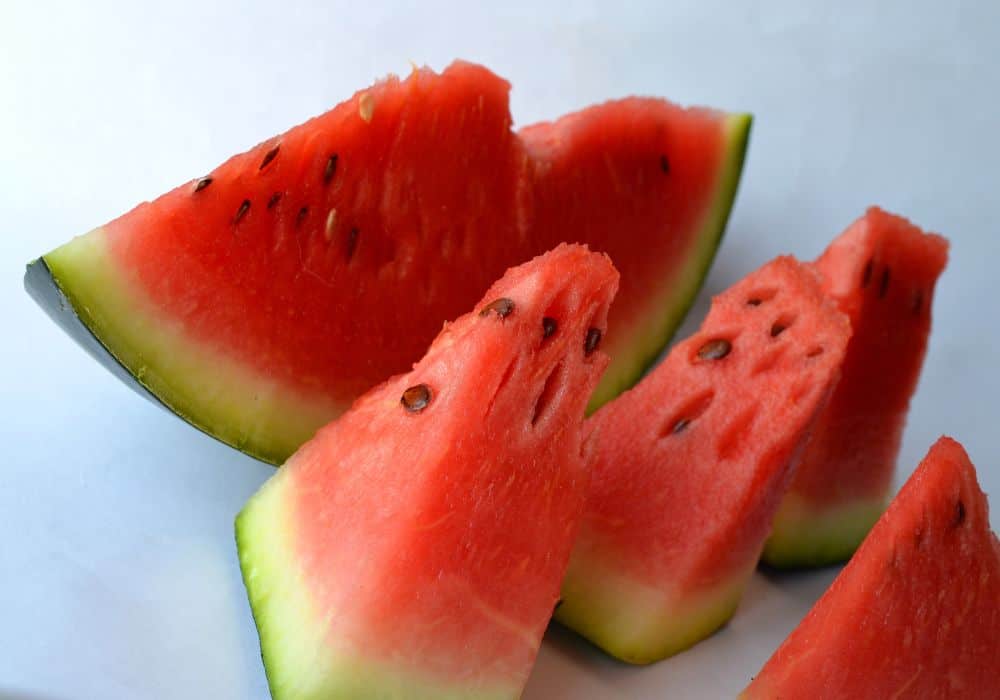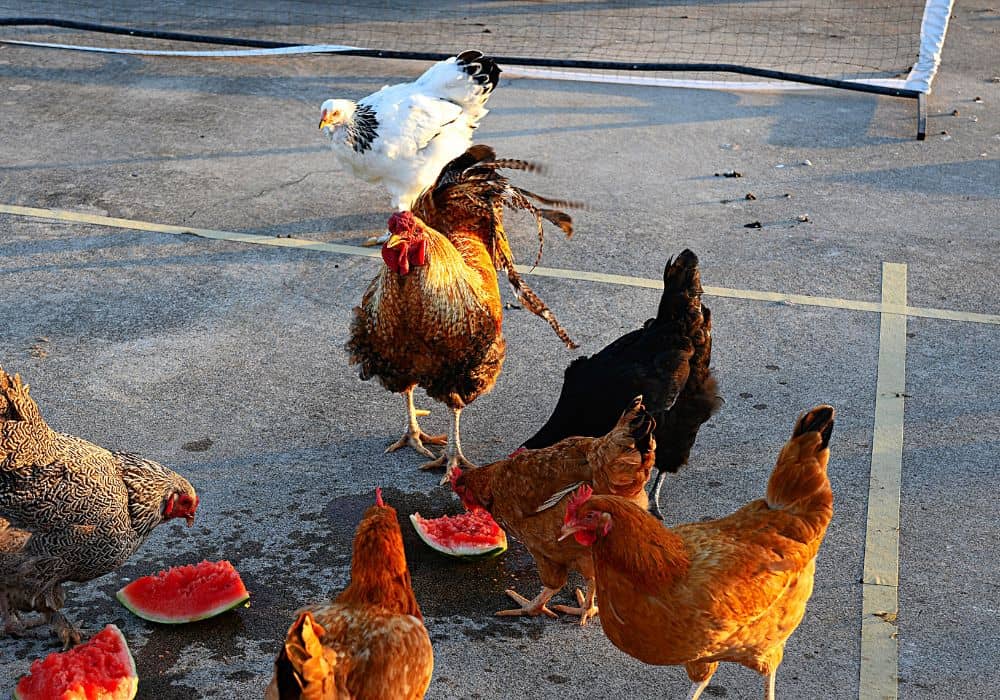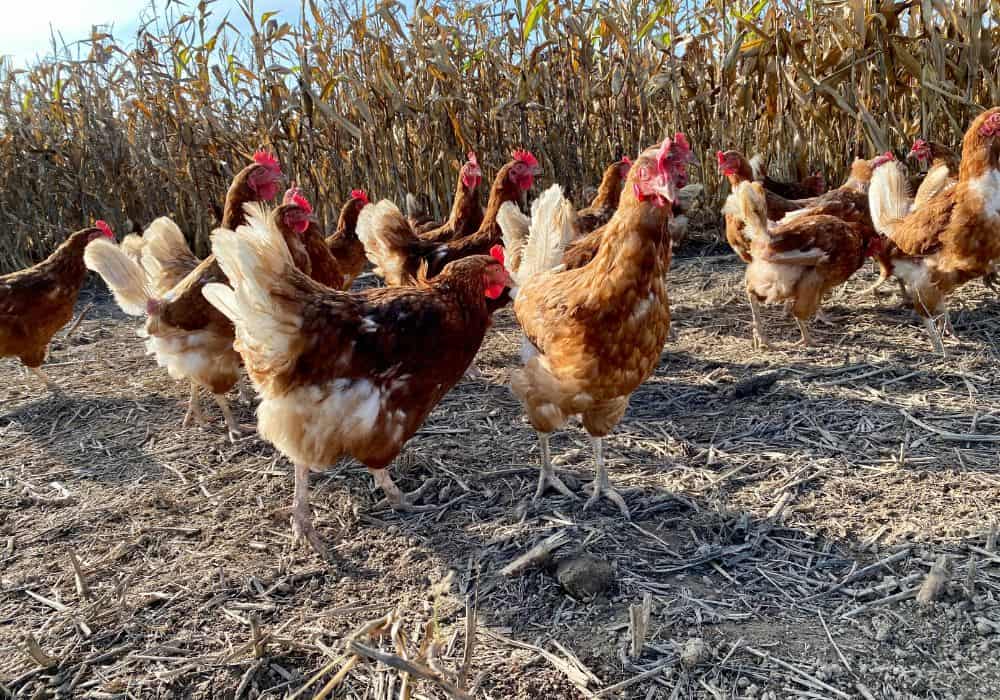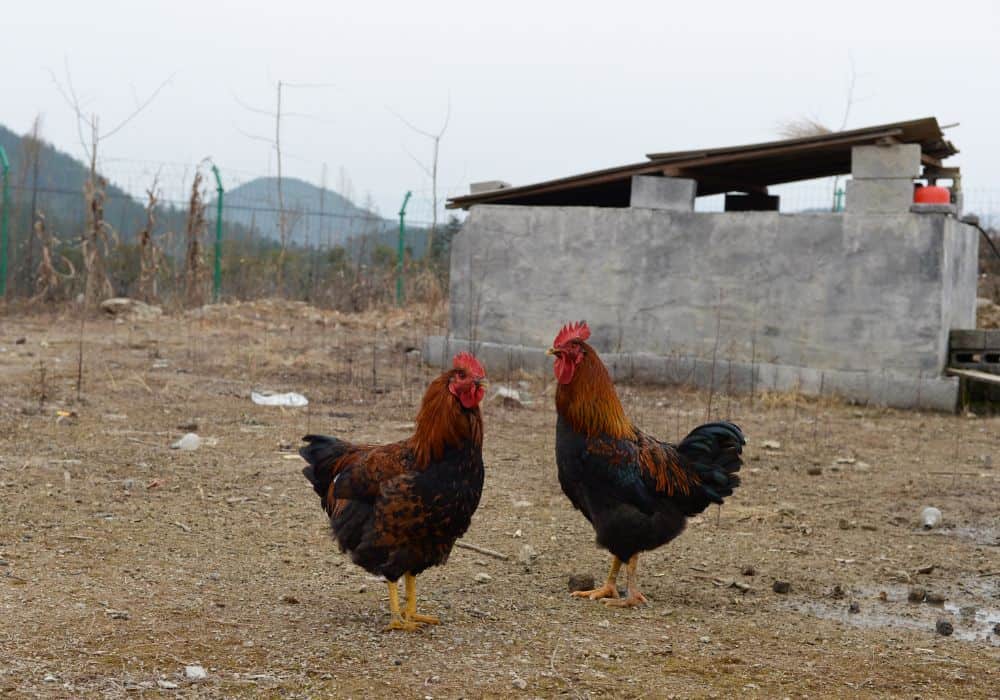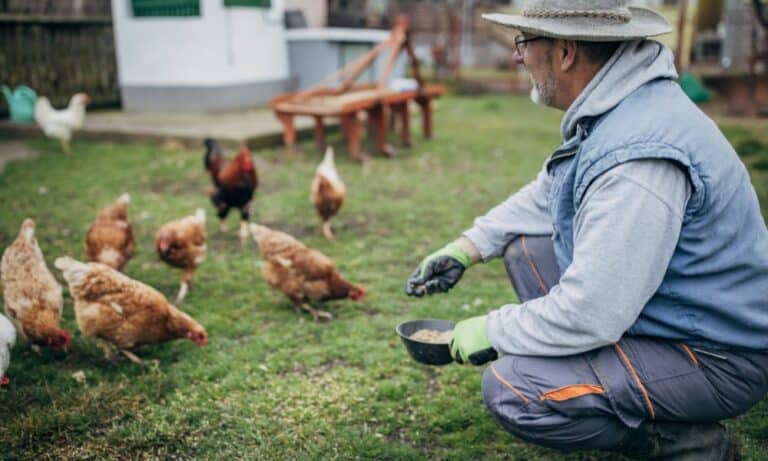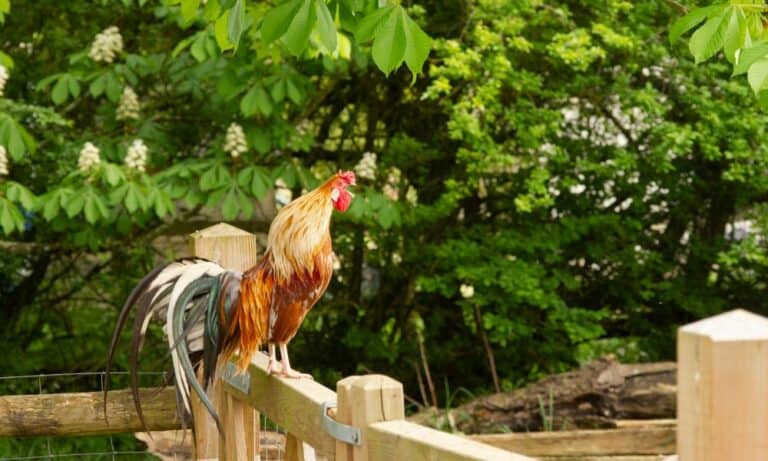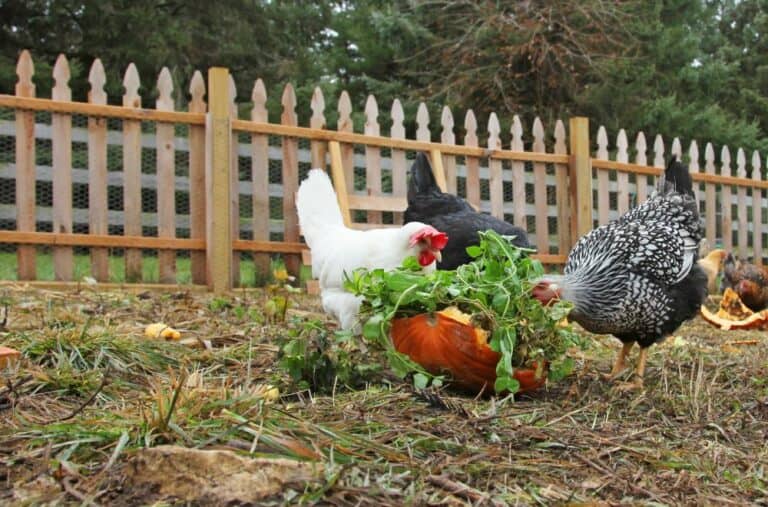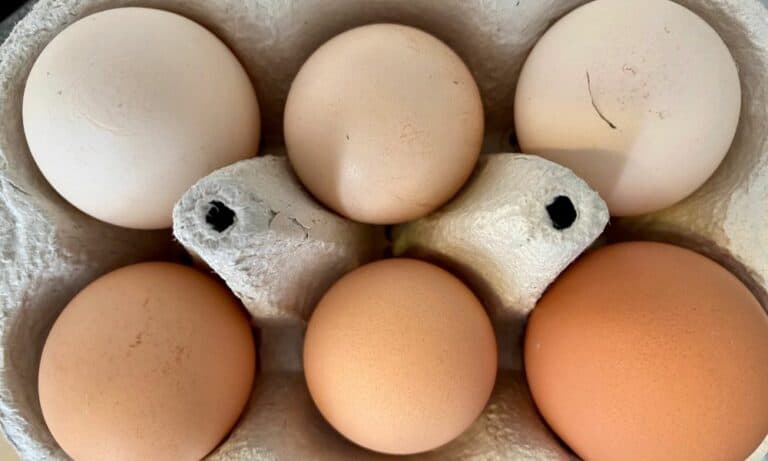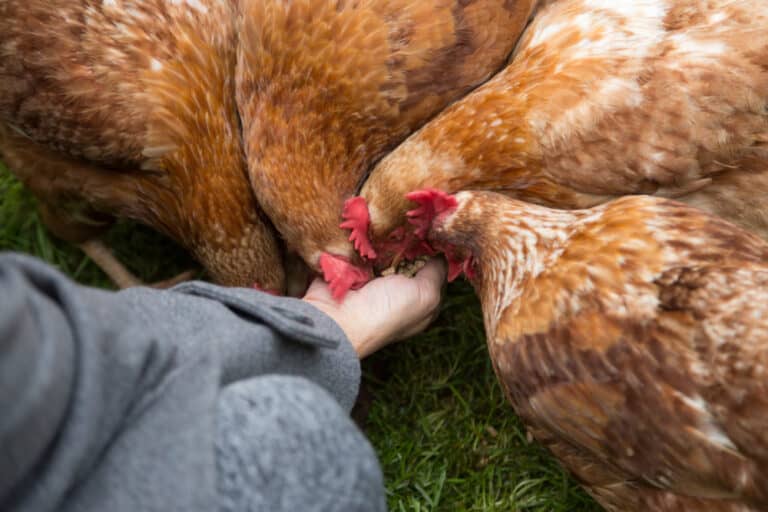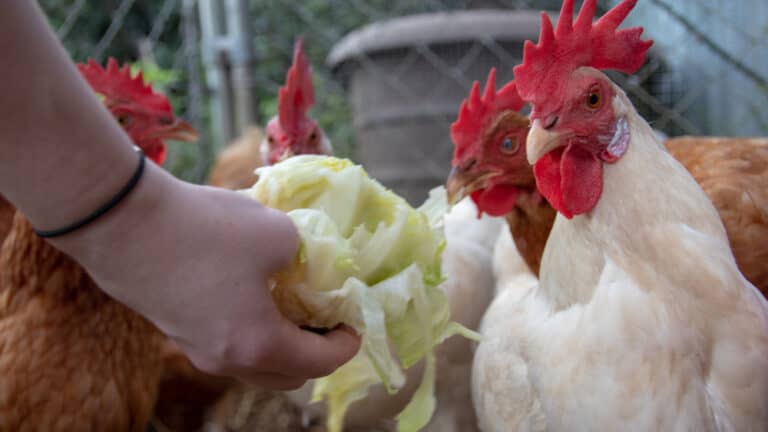When temperatures start to rise, chickens show clear symptoms of heat stress. And that leaves many backyard flock owners wondering: How can I keep my chickens cool in this hot temperature?
Of course, there are many ways to address this problem, and diet is one of them. Eating watermelons is one of the best natural ways to beat the heat in summer. But does the same apply to our feathery friends? Can chickens eat watermelon?
To answer this question, I have compiled everything you need to know about watermelons and chickens within this blog. Let’s dive in!
Is Watermelon Safe for Chickens?
If you’ve ever tried eating watermelon in front of your chickens or tried feeding them one, you are probably no stranger to how much chickens love it. However, that does not necessarily affirm that it’s safe for chickens to eat.
90% of a watermelon is water, and the rest is nutrition. So, that means:
- Watermelon hydrates chickens and prevents heat exhaustion
- It also provides nutritional value.
There are many ways in which a watermelon can benefit a chicken. For example, in summer, chickens are unable to produce vitamin C due to excessive heat stress. But a watermelon appears to be the perfect solution because it is rich in Vitamin C.
Also, this fruit is packed with electrolytes like potassium and magnesium to help combat the high temperatures. It also does not have any saturated or damaging trans fat and has more antioxidants than any other fruit or vegetable.
Antioxidants protect against free radicals, which create instability in cells and may lead to cell breakdown and chronic illnesses. Moreover, watermelons contain lycopene, a carotenoid that boosts the immune system.
So, does that mean watermelons are safe for chickens? Yes, they are! However, there are still downsides since the fruit contains sugar. Too much watermelon can cause diarrhea in chickens.
That is why, as with all other treats, you must be moderate. Do not make watermelons their main diet.
It is also important to note that you must never feed your chickens rotten, spoiled, or moldy watermelons.
“No mold is a general rule of thumb that every flock owner lives by. That’s because molds contain mycotoxins, which can result in liver damage, immune system suppression, and even death.
Here, I would also like to mention that contrary to popular belief, watermelon seeds do not act as a dewormer for chickens. It is a common internet myth, but there is no truth in it as it has not been proven through any study yet.
There are many health benefits of watermelon, but deworming is not one of them!
Can Baby Chicks Eat Watermelon?
Baby chicks that are six weeks old can eat watermelon flesh without harm. However, it is advised that it is introduced to them at 17 weeks old. As far as nutrients go, baby chicks benefit from watermelons in the same way as adult chickens do.
Remember, moderation is important. Also, you must always provide them with chick grit after feeding them watermelons. The grit will help them digest the fruit without any issues. Note that since their digestive systems are still developing, feeding the rind to baby chicks is not advised.
Similarly, feeding seeds to baby chicks can pose health risks too because a chick’s digestive system is not developed enough to break down watermelon seeds. So, while the flesh is perfectly safe, avoid seeds and rinds when feeding watermelon to young chickens.
What Parts Of A Watermelon Can Chickens Eat?
OK, so the fruit is safe to eat. But can the chicken eat all or just a few parts of it? The short answer is all of it. The longer answer is that the flesh is the best part of a watermelon that you can feed to your flock.
For starters, it is rich in nutrients. Secondly, it is also the part that chickens tend to love the most.
But, if it so happens that you ate watermelon and have watermelon scraps and are wondering what to do with it— don’t throw it away.
One thing about chickens is that they are generally not picky eaters. They will eat almost everything you feed them. And the rind and seeds happen to be safe to consume, too!
The rind is not as rich in nutrients as the flesh is, but it contains some amount of vitamins B and C. It is also rich in fiber and can help improve your flock’s digestive systems and produce bulk stool. When it comes to seeds, they are also very much safe for adult chickens to consume.
According to research, seeds are rich in nutrients, with calcium (encourages bone strength), potassium (keeps hydrated), and about 25% of protein (vital for growth). In fact, as part of this research, they fed chickens a powder made from seeds.
As a result, they saw a noticeable improvement in the growth of chickens and the number of eggs they laid.
But that’s not all! You can also feed your flock the watermelon plant itself. While many other plants that produce fruits and vegetables may be harmful, watermelon plants are 100% safe for a chicken’s consumption.
However, please ensure that there are no pesticides on the plant and that it is thoroughly washed. Pesticides and herbicides are incredibly toxic to chickens and, if consumed, will result in death.
Different Ways to Feed Watermelon to Chickens
Now that you know watermelon is safe in its entirety for a chicken to consume, let’s discuss how you can make this treat even more special for your backyard flock! Here are different ways in which you can feed watermelon to chickens:
1. Slice it
Of course, the traditional method always works. Just slice the watermelon and give it to your flock. If you have a small amount of chicken, you can simply cut the melon in half and let them dig through it.
2. Make it a Salad
A soothing, hydrating, and cooling salad will put your chickens at ease on a hot, sunny day. The best part is that you can enjoy this salad, too!
You will need:
- Watermelon rind, grated, with the flesh cut of f— 1 cup
- Chilled watermelon, cut into cubes — 2 cups
- Chilled cucumber, diced, with the skin, included — 1
- Any summer berry (strawberries, blueberries, etc.) — 1 cup
- Fresh mint leaves, chopped — ½ cup
To prepare the salad, mix all the ingredients in a bowl together. You may also freeze it for an hour before eating it or feeding it to your flock.
3. When in Doubt, Blenders Out
Experts suggest that if you need more nutrients from fruits like watermelon, make them into juice. In addition to that, mint serves as a cooling agent. With this method, the end product will be a delicious Mint-Watermelon Slushie. It will also make the fruit easily digestible for your chickens.
You will need:
- Ripe watermelon, cut into cubes, including rind and seeds — 4 cups
- Fresh mint leaves — 2 tablespoons
- Organic honey — 1 tablespoon
- Ice cubes — 6
Add all the ingredients to the blender and blend until smooth. Then, store it in a freezable container and freeze it for two hours before feeding it to the flock.
4. Prepare a Soup
Preparing a watermelon soup with mint is another tasty and more effective way to help your chickens combat heat stress. It’s super easy to make, and the chickens love it! Here’s what you will need:
- Watermelon, halved, with the insides scooped out — 1
- Ice cubes — 1 handful
- Fresh mint — 1 handful for the soup and a little more for garnish.
To make the soup, use a blender or food processor. Add the insides of the watermelon (flesh and seeds) with the ice and mint into the machine and puree until smooth. Your soup is ready. Now pour it into the watermelon halves and garnish with the mint leaves.
Serve the soup in a shady spot. If the chickens don’t eat the rind, refill it with ice water.
5. Make Frozen Watermelon Blocks
Throughout these recipes, if you asked yourself: Can chickens eat frozen watermelon? The answer is yes. They can eat frozen watermelon, but give it to them only on extremely hot days. The chickens will munch on the frozen melon as it defrosts.
For the frozen watermelon blocks, here’s what you need:
- Watermelons sliced into tiny cubes
- A bowl of water
Put the cubed watermelons into the bowl of water and freeze them. Then, give the bowl to your chickens.
Other Ways to Beat The Heat
It is crucial to keep your chickens cool during the summer. If not, they will start to show symptoms of heat stress. These symptoms include exhaustion, lethargy, labored breathing, closed eyes, extremely pale comb, Watters, and feathers spread away from the body.
Heat exhaustion can affect egg production and even result in heat strokes, which may lead to death. If the temperature goes above 75 degrees Fahrenheit, immediately take precautions. Put your chickens in shady areas, ventilate their coop and keep it cool, and provide them with cold, fresh water.
If you start to notice symptoms of heat exhaustion, take the chicken somewhere cool immediately. Next, soak its feet and legs in a tub of cool water. Note that the feathers must not get wet as it will prevent the chicken from regulating its body temperature.
Lastly, give the hen cool water to drink, along with homemade electrolytes like Pedialyte. Chickens suffering from heat exhaustion might not drink water. In such situations, treats like watermelons come in handy. The chicken will not be able to resist, and you will have saved its life!
What fruits are toxic to chickens?
Apart from watermelon flesh, plenty of other fruits are rich in taste but unhealthy for chickens. Some only deteriorate their health, while others can cause instant death.
Here’s the list of the fruits that are potentially toxic to your chicken flock and should be removed from their feed:
- Apple seeds: Apple benefits the chicken flock as long as you keep the seeds away. Apple seeds contain a small amount of toxic cyanide, which is enough to give that fatal blow to your chickens if they consume it.
- Avocado skin: Although avocado does taste sweet, its skins and pits contain a toxic element known as persin. Persin in chickens can cause increased heart rate, breathing difficulties, and severe heat problems that can cause sudden death. You can feed them the fleshy part but never the skins and pits.
- Apricot pits: Apricot is a sugary fruit that will not harm the chickens if fed occasionally. However, its pits, leaves, and stems contain cyanogenic glycosides that are toxic and deadly for the chickens.
On the bright side, there are still many kitchen leftovers like pumpkin, rice, and sweet potatoes to feed your chickens. Watch this video to learn about the foods you can and can not give to your chickens:
Conclusion
Watermelon is not only safe for chickens to eat, but it is also a nutritious and affordable treat. Although you must not make it the main component of their diet, feeding your chickens watermelons during summer will always work in their best interest.
Chickens love to munch on the fruit and can eat all parts of it. With young chickens, however, be careful to only feed the flesh as they can’t digest the rind and seeds. Lastly, try to keep your chickens as cool as you can in summer.
If you notice symptoms of heat exhaustion:
- Immediately take the chicken somewhere cool
- Soak its feet and legs in a tub of cool water.
- Give it cool water to drink alongside homemade electrolytes
- Feed watermelon if it refuses water.
To avoid heat exhaustion altogether, ensure that you’re providing enough shade and hydration at all times in the summer. And providing them with chilled watermelons every few days is one of the best methods to beat the heat.
Be sure to try the different watermelon recipes listed above, and if you have any questions, let me know in the comments!

